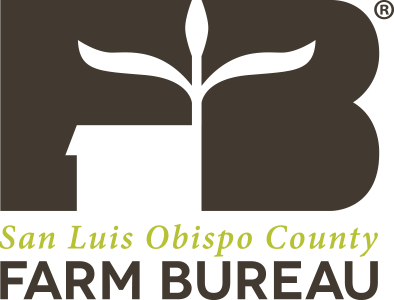
By Dave Kranz, California Farm Bureau Federation (CFBF) Ag Alert Editor. Reprinted by permission of CFBF.
Focusing on immigration policy, water resources and the upcoming rewrite of federal farm legislation, members of the
California Farm Bureau Federation Board of Directors conducted a series of meetings with congressional leaders and administration officials in Washington, D.C. in February.
The trip occurred during a time of intense discussions regarding immigration policy, prompted by introduction of a Republican-sponsored bill called the Securing America's Future Act, which provides funding for a border wall and addresses internal immigration enforcement and the Deferred Action for Childhood Arrivals program. The package also includes an Agricultural Guestworker Act that seeks to improve the immigration system for farm employees but about which CFBF and other agricultural organizations have expressed concerns.
"This was an important time to be on Capitol Hill, to make sure our representatives know what's needed to create an immigration system that empowers both agricultural employees and employers," CFBF President Jamie Johansson said. "I think we succeeded in getting our points across."
In meetings with California congressional representatives and their staff members, CFBF officers and directors stressed the need to modify the AG Act to make it more useful for farm employers and employees alike. They cited three features of the current proposal as problematic: that it caps the number of agricultural visas at 450,000; that it requires unauthorized employees to leave the U.S. in order to apply for a visa; and that the visas lack the flexibility needed in particular for people who grow and harvest fruit, vegetable and nut crops.
In addition, the AG Act would tie creation of the new H-2C visa program to mandatory use of the E-Verify electronic eligibility system, which CFBF leaders said could affect a large proportion of the existing agricultural workforce.
"We certainly respect the need to maintain and enhance border security," Johansson said, "and we think that can be done while providing farmers, ranchers and their employees with a better immigration system."
CFBF leaders encouraged California congressional representatives to work for a system that allows agricultural employees to earn legal status without being required to leave their homes and families, and which features visas that provide sufficient flexibility to allow the new program to function like the current labor market. CFBF also recommended creation of a program to accommodate future agricultural employees from other countries.
With California appearing to lapse back into drought after last winter's heavy downpours refilled surface reservoirs, the CFBF delegation stressed the need for additional congressional action to address the state's water system.
Johansson noted that passage of the Water Infrastructure Improvements for the Nation Act in 2016 provided additional flexibility to operate water projects in California while accounting for protected species.
"We want to be sure the WIIN Act can be as effective in dry years as it was last winter, during heavy flows," he said.
CFBF representatives also stressed the need to include California water projects in the federal infrastructure package President Trump promoted in his State of the Union address.
"For Californians, there's no more important infrastructure right now than how we store and transport water in our state," Johansson said.
Congress is due to write new federal farm legislation this year, a prospect the CFBF delegation discussed with the ranking Democrat on the Senate Agriculture Committee, Sen. Debbie Stabenow, D-Mich., and with key members of the committee staff.
Stabenow told the CFBF group that negotiations on specifics of a new farm bill have begun, with hopes for a completed bill by late spring. Both she and staff for the Republican majority on the committee warned of budget constraints that could affect the 2018 Farm Bill.
CFBF representatives said the new farm bill should benefit all of agriculture through effective safety-net programs, improved working-lands initiatives and an emphasis on research. They expressed support for extending a pilot program for a crop insurance product called Whole Farm Revenue Protection, which covers more than 250 commodities—many of which had never been insurable in the past.
Johansson said CFBF also sought an improved dairy chapter in the farm bill, to address deficiencies in the existing Margin Protection Program.
"MPP doesn't work for California dairies, given the size of our herds," he said. "It has left thousands of dairies struggling during trying times."
The CFBF delegation discussed trade policy during a meeting at U.S. Department of Agriculture headquarters with Ted McKinney, USDA under secretary for trade and foreign agricultural affairs. McKinney expressed optimism about the ultimate outcome of negotiations to modernize the North American Free Trade Agreement with Canada and Mexico, though he warned the talks would be neither fast nor easy.
During a meeting with officials from the U.S. Forest Service, CFBF leaders expressed support for forest-management methods such as thinning and controlled burning to reduce wildfire threats.
The CFBF delegation expressed continued support for legislation that reduces barriers to active forest management and provides a solution to fire funding for the Forest Service. USFS officials told the group that close to 60 percent of the agency's budget has been redirected to firefighting needs.
(Dave Kranz is editor of Ag Alert. He may be contacted at dkranz@cfbf.com.)



